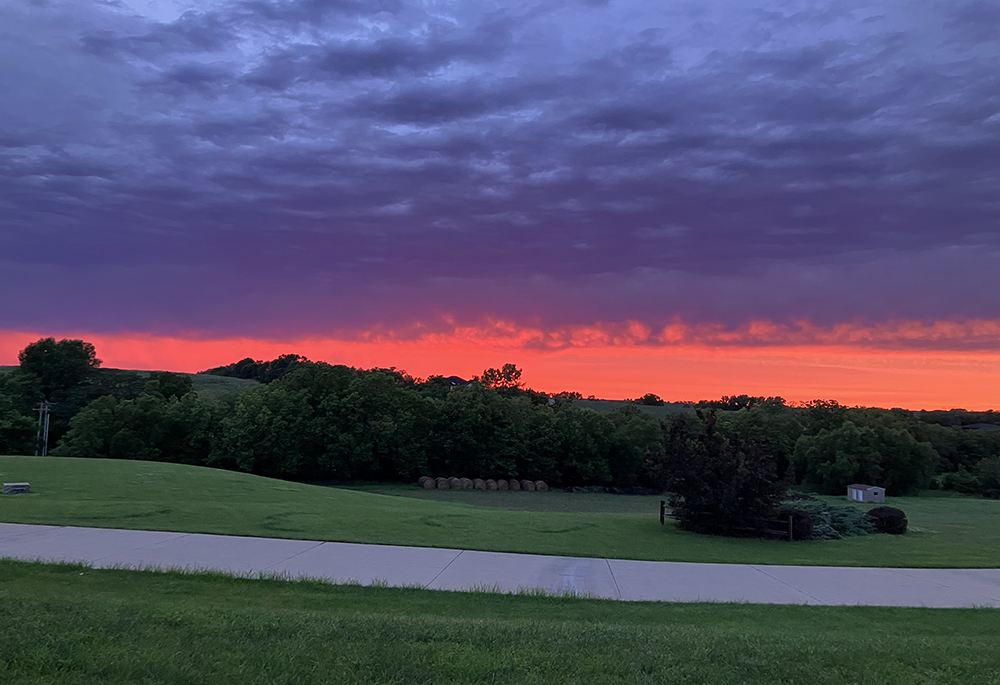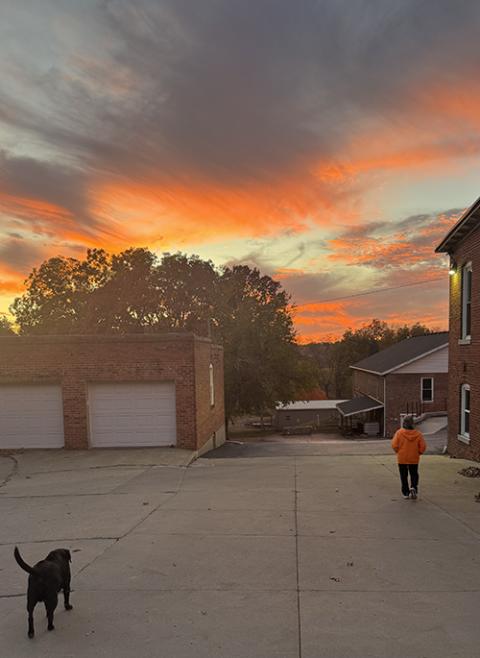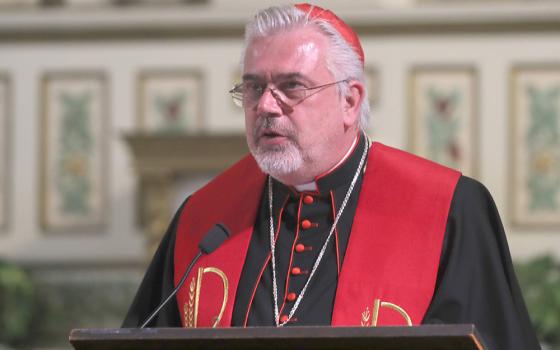
The sun sets over the Benedictine Monastery in Clyde, Missouri, in August 2025. (Helen Mueting)
As the Season of Creation draws to a close, I find myself pausing to notice the ways it invites us to renew our love and care for the world around us. At Mount St. Scholastica, we Benedictines mark this time in many small but meaningful ways.
We work together cleaning up our campus, offer special petitions during our Liturgy of the Hours, place quotes about climate change on our dining room tables, and hold a prayer service celebrating creation. For me, this season has also been a moment to return to a beloved poem by Gerard Manley Hopkins, "God's Grandeur," written in the 19th century:
The world is charged with the grandeur of God.
It will flame out, like shining from shook foil;
It gathers to a greatness, like the ooze of oil.
Crushed. Why do men then now not reck his rod?
Generations have trod, have trod, have trod;
And all is seared with trade; bleared, smeared with toil;
And wears man’s smudge and shares man’s smell: the soil
Is bare now, nor can foot feel, being shod.
And for all this, nature is never spent:
There lives the dearest freshness deep down things;
And though the last lights off the black West went
Oh, morning, at the brown brink eastward, springs —
Because the Holy Ghost over the bent
World broods with warm breast and with ah! bright wings.
The poem is a Petrarchan sonnet, which means that it is divided into an octet and a sestet. The octet (first 8 lines) states a problem, and the sestet (last six lines) shows a resolution to the problem.
Advertisement
In the octet, Hopkins describes the world as "charged with the grandeur of God." This phrase suggests rose-colored sunsets and sunrises, bright stars, varieties of blooming flowers, majestic mountains, and sparkling bodies of water. Hopkins describes the world with vibrant verbs.
In the fourth line, his vocabulary changes to heavier, more negative words, portraying a world that is being transformed in a negative way. It is being crushed and trod on by numerous people. For Hopkins, the industrial revolution was changing the world as he knew it. It was creating pockets of poverty and adding factories with their pollution and sometimes inhumane work environments. Nature was no longer part of everyone’s life since many had to move to the city to make a living.
Although this poem was written in the 19th century, it could be talking about our world today. Factories continue to pollute our air, and the lives of factory workers, especially in developing nations, are far from ideal. Workers are subject to toxins, long hours and low wages.
Forests are being devastated by companies eager for their wood; shores are littered with plastic waste and other garbage; and healthy food is becoming much more difficult to find. Our earth does wear our smell and is being trod by a civilization that ravages the land for its own needs without regard to what that means for future generations.

Author Helen Mueting walks outside with Sophie, the sisters’ black lab at the Benedictine monastery in Atchison, Kansas, as a fall sunset colors the background. (Courtesy of Helen Mueting)
Yet, Hopkins tells us that nature "is never spent," that deep within it lives new life. The Spirit broods over the earth, calling it to life. As St. Paul tells us in Romans 8:22, "We know that the whole creation has been groaning as in the pains of childbirth right up to the present time." Creation longs for life and will seek it in any way possible. It has to keep on growing.
That is often hard for us to see. Here in the United States in the Midwest, we see our seasons changing. Summer seems to last longer and to be hotter; winters are shorter and not as cold. We are behind in our average rainfall.
Our country has proposed rolling back some of its EPA regulations, increasing production of more fossil fuels. Other actions enable killing more forests for wood, promoting the production of more nonrecyclable plastics, and encouraging people to buy more rather than to re-use what we have. We have become a throwaway society, but where is this "away" we throw things?
At times, it can seem like we are in an endless cycle of slowly killing our earth and eventually killing off ourselves. Where is the morning that springs from the "lights off the black West"?
The hope of the Spirit’s renewal lies in noticing the many little ways people are working together against the possible damages of climate change. Some are trying to stop climate change by reducing fossil fuel use through renewable energy; some are shifting to sustainable transportation and diets; some are restoring forests and ecosystems; and some are advocating for government policies and corporate changes.
The hope of the Spirit’s renewal lies in noticing the many little ways people are working together against the possible damages of climate change.
Individually, people are trying to use less energy, eat more plants, and reduce consumption and waste. Globally, countries are working on international agreements like the Paris Agreement to set greenhouse gas reduction targets.
The hope lies in each one of us doing what little we can whether it is buying used clothes, repurposing items that are thrown away, or turning down the thermostat in winter or up in the summer.
It is remembering that the earth is not just ours. It is our children’s future and habitat for numerous animals, insects and plants. God gave the world we inhabit to our care, not to our domination. To care for it, we must love it, nurturing it with the Spirit as it comes to life.






